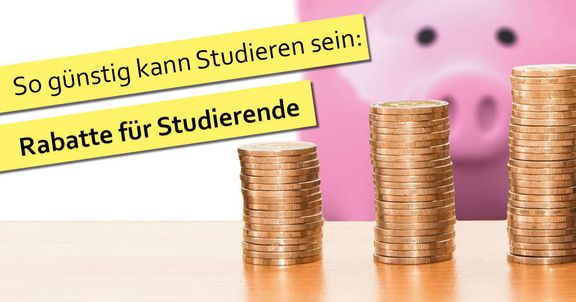A fantastic multicultural place
Where else could you experience three languages and cultures in just one day? Where else could you enjoy the view of the alps and then breathe the scents of the Mediterranean? Where else can you ski down the slopes and enjoy the culures of three provincical capitals of different countries in just one day?
These experiences across three borders is unique to Carinthia!
The geographical position of Carinthia in the South of Austria is not only attractive because of its natural beauty, the numerous lakes, and the mountains, it is also an important axis of cultural and incellectual exchange in the Alpine-Adria Region.
Especially the fast growing markets in the neighboring EU counties Slovenia or Croatia open up additional career possibilities for qualified, motivated, and well-educated people with inter-cultural background and foreign language competencies. By the same token, our students can benefit from the long tradition of business relationships between Carinthia, Italy, and Slovenia.
The international, borderless idea of CUAS is also apparent in the intensive academic exchange with more than 100 partner universities and numerous contacts to business partners all over the world. Students are offered a wide variety of choices for study exchange and internships worldwide.
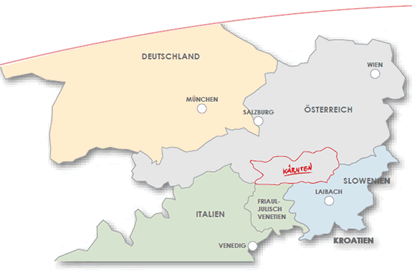
Studying and Living in Carinthia
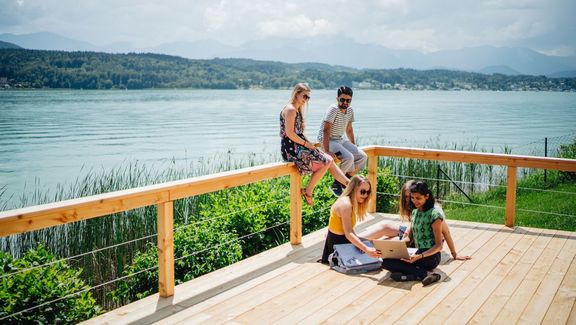
Studying and living in Carinthia offers a lot of cultural and sports events. You can take part in a great variety of leisure activities, while enjoying an excellent quality of living throughout your studies.
Each of the sites of CUAS has its advantages – life is worth living in Carinthia!
In Spittal an der Drau (www.spittal-drau.at) you cannot only enjoy a night out at the theater at the Renaissance-castle “Porcia” but you can participate in a lot of other leisure activities. You can keep the cool by jumping into one of the local lakes (Weißensee or Millstättersee) in the summer. Or you can just take a hiking tour in upper Carinthia and enjoy the beautiful landscape. In winter you can go skiing at the Goldeck or the Naßfeld.
CUAS in Villach (www.villach.at) is situated next to one of the main traffic junctions to Italy, Salzburg, and Vienna. You can reach the city center within 10 minutes by bus. There you can spend your time shopping or in modern cafés or bars. You could also take a day-trip to Italy or Slovenia. Villach offers a variety of events throughout the year (the famous carnival – Villacher Fasching, the festival – Villacher Kirchtag, The European Harley Bike Week, Jazz over Villach, Honky Tonk Festival, Summertime, bars outside in the nature – Ackern, or the juggler festival, etc).
CUAS in Feldkirchen (www.feldkirchen.at) is situated in middle Carinthia. This small but attractive town is surrounded by beautiful landscape and offers many possibilities for outings. It is possible to spend unforgettable days at the Turracher Höhe or in Bad Kleinkirchheim in the summer and in the winter time. If you are interested in culture, you can enjoy one of the many events with musicians & comedians.
CUAS in Klagenfurt (www.klagenfurt.at) is the fourth site. In our provincial capital you can experience a variety of leisure time possibilities. Lake Wörth alone offers numerous event highlights in Carinthia throughout the summer. Exciting evenings in Velden, Pörtschach or at the city borders of Klagenfurt are bound to happen! Must-see events include the Ironman Austria, star night in Pörtschach, Fete Blanche in Velden, as well as the Beach Volleyball Grand Slam event in Klagenfurt. The renown Stadttheater Klagenfurt offers plays for many different tastes. To sum up, Klagenfurt is a happening place, with a lot of events and definitely worth-while seeing.
Life and Living
The cities of Villach, Klagenfurt and Spittal offer student dorms, however, most students rent private accommodation.
The average monthly costs of rooms vary between EUR 425.00 and € 724.00 and for a small apartment you may pay EUR 60.00 per night or EUR 1800.00 per month (1-4 persons). A standard rental contract is signed for a minimum period of three years. A deposit in the range from one to three monthly rents is standard procedure in Austria. When you move into your new room or apartment, we recommend you take photos to document the state of the property. This may help you get back your deposit afterwards, in case the landlord claims money for renovation or repairs. The possibility of terminating the contract is written in the contract and mostly you have to respect a 2- or 3–month notice period to the end of a month.
You have to pay punctually on the agreed day of payment each month.Rents normally include “Betriebskosten“ (utilities), but extra costs for electricity have to be paid additionally each month.
If you arrive too late in the evening to get into your reserved room, we suggest you spend the night in a youth hostel (cost: approx. EUR 16.-).

Sollten Sie bei Ihrer Ankunft in Kärnten zu spät am Abend zu Ihrer reservierten Unterkunft kommen, empfehlen wir, die Nacht in einer Jugendherberge zu verbringen. Die Kosten hierbei belaufen sich auf ca. EUR 29,00 pro Nacht.
Die Plattform www.trivago.at bietet ebenfalls Informationen zu Unterkünften wie Hotels oder Pensionen. Auch dieser Link könnte hilfreich sein Housing OeAD.
Less than one kilometer away from the FH Kärnten Campus Spittal is the Kolping Student Dormitory. There are about 40 single rooms for students who are accommodated separately from the students. The rent is between EUR 425.00 and EUR 724.00 (depending on the length of stay and whether with breakfast / half board / full board). The single rooms are between 20m² and 25m² (shower, WC, bathroom in the room, internet connection and SAT- connection available). Eight students share one floor kitchen with separate lockable refrigerators and cabinets. There is also the possibility to take the room with breakfast, half board or full board. Furthermore, laundry facilities are offered in the basement. Parking spaces are available for a monthly rent of EUR 50.00. In addition, a deposit of EUR 400.00 is required. In the months of October to May, a monthly energy cost surcharge of EUR 50.00 is charged!
The walk from the dormitory to the CUAS site takes about five minutes. Room requests may be sent directly to the Kolping House per mail: office[at]kolping-spittal[dot]at
Info Phone: 04762-5333
http://www.kolping-spittal.at
There is a dormitory in the Robert-Musil Str. 9 in 9500 Villach which is about 4 km away from the university. There are only single rooms, furnished with a table, bed, wardrobe and chair with shared bathroom facilities for three students each and a shared kitchen on each floor. The building offers laundry facilities in the basement. CUAS students have free wireless internet access. In order to reach the university you have to use buses, the walking distance to university is about 50 minutes. Moreover it is possible to use a bicycle to travel to university. Requests for rooms can be sent to Mr. Gottfried Sapetschnig: stuho-villach[at]outlook[dot]at
www.studenthouse-villach.at
There is a new dormitory close to CUAS site in Villach which costs EUR 445.00 per month all inclusive, the deposit is EUR 750.00. There are no additional fees at the conclusion of the contract (only deposit and the first month's rent).
There are double room apartments, furnished with one desk, bed, wardrobe, chair and television each with shared bathroom facilities for two students each and shared kitchen installations. The building offers laundry facilities. This dormitory is located right next to CUAS Campus Villach, but is about 5 km removed from the city center. Internetaccess is fress.
Room reservations and more information can be found exclusively at www.stuwo.at/studentenheime/villach or www.stuwo.at/en/dormitories/villach
CUAS in Feldkirchen (www.feldkirchen.at) is situated in middle Carinthia. This attractive, small town is surrounded by beautiful landscape and offers many possibilities for outings. You can spend unforgettable days at the Turracher Höhe or in Bad Kleinkirchheim in the summer and in the winter time. If you are interested in culture, you can enjoy one of the many events with musicians and comedians.
Lists of private landlords are available by the Student Information Center. Further possibilities how to organize accommodation are listed below on this website.
Private offers for students are also available on Intranet (access only with student status). Furthermore lists of private landlords are available on each CUAS site.
Moreover following links might be useful when looking for private accommodation:
- https://www.immobilienscout24.at
- https://www.home4students.at
- https://www.wg-gesucht.de/wg-zimmer-in-Villach.526.0.0.0.html
- https://www.willhaben.at
- https://www.wunschimmo.de/wohnen
- https://www.akademikerhilfe.at/de/studentenheime
- www.immotom.com
- www.housingtarget.com
- www.teamhaus-kaernten.at/angebotsgruppe/studentenunterkunft/
ADDITIONAL INFORMATION
Please note that CUAS International Relations Office supports Incoming Exchange Students (coming from partner universities) in organizing accommodation if they send an email at least two months prior to their arrival.
Regular international students can also contact the administrative assistant of the relative CUAS-site where lists of possible accommodation facilities are available.
Approximate monthly cost of living expenses are listed in the table below. Please note that these costs are average estimates and will vary depending on one’s personal lifestyle. Accommodation costs are based upon dormitory or apartment-sharing pricing, but a small apartment may be financed with approximately EUR 500.00 at all of our sites. The approximate monthly expenses in Carinthia may actually be lower than those listed below.
- Shared Apartment (incl. heating and electricity) € 500.-
- Foods (not including cigarettes, or alcoholic beverages) € 400.-
- Other personal and study costs (books, culture, entertainment) € 400.-
- Total costs € 1300.-
Additional costs that should be considered
- Tuition fee per semester € 363.36
- Austrian National Union of students fee per Semester € 21.20
- Austrian Health Insurance by ÖGK per month € 66.79
Further Information about living costs https://studyinaustria.at/en/living/living-costs/
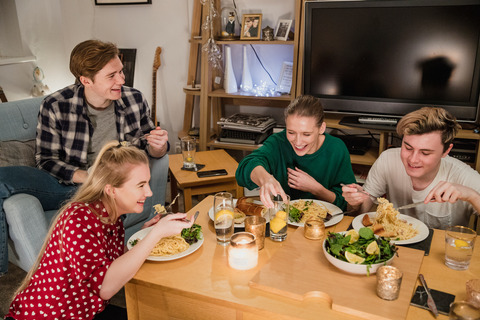
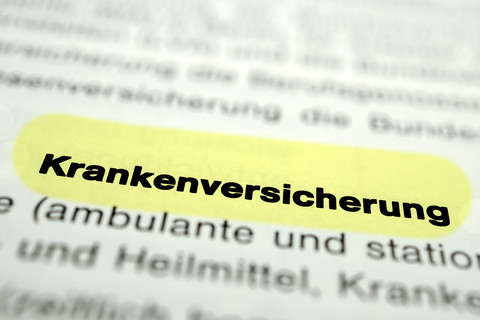
Each student applying for a visa has to show proof of insurance covering all expenses in case of illness or accident. It is recommended that everyone takes out insurance. The international students can either organize health insurance for Austria in their home country or pay for Austrian national health insurance (GKK) upon arrival in Austria. The cost is estimated at EUR 69.13 per month [status 2024].
Additionally, all students are covered by Austrian National Union of Students Accident Insurance. Note that this insurance does NOT cover all possible accidents and additional private insurance is necessary.
You can find the information about the Austrian national insurance system under the following link:
https://oead.at/en/to-austria/scholars/before-arrival/insurance/
Source: https://studentpoint.univie.ac.at/en/financial-matters/reductions/health-insurance/
Students, who are not insured due to an employment or in the framework of a scholarship, need to apply for insurance or co-insurance themselves.
For both types of health insurance (self-insurance and co-insurance) you will need to meet certain requirements. For further information please contact the respective insurance company directly, as every health insurance has its individual procedures.
Co-insurance
- Age limit: 27,
- Performance record/transcript of records: either 16 ECTS or 8 semester week hours per year,
- Duration of study: the co-insurance is not limited to a certain amount of Semesters.
The free co-insurance with your parents (or grandparents) is only possible until the age of 27. The co-insurance with your spouse or life partner is not limited to a certain age. However, this form of insurance is not always free of charge.
Self-insurance
There are two different types of self-insurance: the student self-insurance and the general self-insurance. For further information about the amount of the insurance please contact the respective insurance company.
Student self-insurance
For this type of insurance you will be required to have a permanent residence in Austria and not have completed a degree programme yet.
- Age: no age limit,
- Maximum income: € 15.000,
- Duration of study: minimum study duration plus 4 extra Semesters,
- Change of study programme: not more than two changes allowed and the change needs to take place the latest after the 2nd Semester.
- Feldkirchen: Paracelsusstraße 12; Tel. 050 5855 4500; e-mail: feldkirchen[at]kgkk[dot]at
- Klagenfurt: Kempfstr. 8; Tel. 050 5855 1000; e-mail: kaerntner.gkk[at]kgkk[dot]at
- Spittal: Ortenburger Straße 4; Tel. 050 5855 4200; e-mail: spittal[at]kgkk[dot]at
- Villach: Zeidler-von-Görz-Straße 3; Tel. 050 5855 4400; e-mail: villach[at]kgkk[dot]at
Source: https://ec.europa.eu/social/main.jsp?catId=559&langId=en
What is the European Health Insurance Card?
A free card that gives you access to medically necessary, state-provided healthcare during a temporary stay in any of the 27 EU countries, Iceland, Liechtenstein, Norway and Switzerland, under the same conditions and at the same cost (free in some countries) as people insured in that country. Cards are issued by your national health insurance provider.
Important – the European Health Insurance Card:
- is not an alternative to travel insurance. It does not cover any private healthcare or costs such as a return flight to your home country or lost/stolen property,
- does not cover your costs if you are travelling for the express purpose of obtaining medical treatment,
- does not guarantee free services. As each country’s healthcare system is different services that cost nothing at home might not be free in another country.
There are no medical facilities on any of the CUAS sites. In case of an emergency, there are hospitals in three of the four CUAS site cities – in Klagenfurt, Villach and Spittal. Furthermore, there are both medical doctors that cooperate with insurance companies and private doctors available almost everywhere. Pharmacies can be found in every city and town.
International emergency number ............................. 112
Ambulance ............................................................... 144
Emergency number (medical doctor) ....................... 141
Information regarding poisoning ............... 01 406 43 43
Emergency number (stand-by doctors) ...... 0900 88 088 + Postleitzahl
- Austrian association of pharmacies
- Association of medical doctors
- Carinthian Hospitals – KABEG
- Psycho-social-services Carinthia – AVS
- National health insurance
English speaking doctors in Villach including their opening hours can be found on:
- www.aekktn.at/arztsuche
- www.docfinder.at/
- www.villach-tipp.at/DE/aerzte_arzt_in_villach_DE.html

When it is time for you to complete your preparations for your time at CUAS you should, among other things:
- Make sure you have a valid passport
- Check whether you need to apply for a residence permit or visa
- Start looking for accommodation
- Make sure you are properly insured and bring the insurance proof with you.
- Make sure you have money to cover for living expenses and tuition fees. Also bring proof of sufficient financial means with you (e.g. statement of bank account)
- If you want to drive a car in Austria, organize an international driving license.
- Don’t forget your adapter plugs and transformers that match the Austrian standard (two round prongs, 220 volts)
RESIDENCE PERMIT
Information for citizens of an EU/EEA country
In order to travel to Austria a valid travel document (passport, identity card) is required. Ample finances and a health insurance accepted in Austria are also advisable.
If you are staying in Austria for longer than 3 months you have to register with the Bezirkshauptmannschaft) within the first 3 months of your stay and you will receive a confirmation of registration (EUR 15.00 fee). For this registration the following documents are necessary:
- filled in and signed application form
- valid identification card or passport,
- proof of a health insurance covering all the necessary costs (e.g. European Health Insurance Card),
- proof of sufficient financial means,
- students also need a confirmation of admission by the university.
Information for citizens of other countries
Students from non EU countries planning to study in Austria (as Joint-Study/Free Mover or as regular student) for up to six months need a visa. Visa has to be applied personally for at the competent Austrian representation authority (embassy, consulate-general) before leaving for Austria and it will be issued by this authority.
Students from third countries planning to study in Austria for more then six months need a residence permit "student" (Aufenthaltsbewilligung "Studierender") for entry and residence in Austria. On principle the application for this permit has to be submitted personally at the competent Austrian representation authority (embassy, consulate-general) abroad before leaving for Austria. The application will be forwarded and processed in Austria by the competent authority.
Detailed information about residence permits and visa applications in Austria is provided by The Austrian Agency for International Mobility and Cooperation in Education, Science and Research at: www.oead.at/en
For further information you can also refer to the Austrian foreign representations: www.bmeia.gv.at/en
or to the website of Help-Service for Foreign Citizens:
https://www.help.gv.at/Portal.Node/hlpd/public
DEALING WITH LANGUAGE
German is the official language of Austria, although you will find that many people are at least somewhat capable of conversing in English. The German dialect spoken in Carinthia might be even more troublesome to understand - even fluent speakers of German might have difficulties understanding some Austrian dialects. For quick and uncomplicated English-German dictionaries visit dict.leo.org or http://www.pons.de.
Information for nationals of an EU/EEA country
Confirmation of Registration
If you are a national of an EU/EEA country or Switzerland you need no visa and enjoy freedom of domicile (Niederlassungsfreiheit). If you have sufficient financial means to finance your stay in Austria and a valid health insurance covering all the necessary costs you only need a valid travel document (passport or identity card) for entry to and residence in Austria.
If you are going to stay in Austria for more than 3 months you have to register with the competent municipal authority (Magistrat, Bezirkshauptmannschaft) within 4 months of your stay and you will receive a confirmation of registration.
More information can be found here.
Information for nationals of other countries
Stays of up to 6 months
Visa information
If you want to study in Austria for no longer than 6 months, you will either need
- a travel visa C ("Schengenvisa"): entitles you to stay in Austria and in all other Schengencountries for a maximum of 90 days; it is not necessary if you are allowed to enter Austria without a visa; or
- a residence visa D (Aufenthaltsvisum D): for stays of at least 91 days up to a maximum of 6 months; not necessary if you are a Japanese national
for entry to and residence in Austria.
Information on procedures and obtainment of visa can be found here.
Detailed information about Schengenvisa: visaguide.world/europe/schengen-visa/
Please take note that the visa has to be obtained before arriving in Austria (though in some cases, entry without visa is possible)! For further information regarding entrance to Austria and visa requirements, application forms please refer to the Austrian foreign representations.
Stays of more than 6 months
Residence Permit
You have to apply for the residence permit in person at the competent Austrian representative authority (embassy, consulate-general) abroad before travelling to Austria. The application will be forwarded to Austria by the representative authority and processed by the competent Austrian authority.
Since you have to await the decision in your home country you should apply at least 3 months before the intended entry to Austria.
Amongst other things, the application has to include the Confirmation of Accommodation as well as the “Proof of Sufficient Financial Means”:
- Proof of sufficient financial means to finance your stay: students up to 24 years of age have to prove that they have at least EUR 552.53 per month, students of 24 years of age or older have to prove that they have at least EUR 1000.48 per month [as of 2021] – these amounts have to be proved for a maximum of 12 months – e.g. by means of a savings account or a bank account at a bank (the account has to be accessible from Austria) or a (declaration of guarantee) of a person living in Austria or proof of purchase of traveller’s cheques for the necessary amount or a confirmation of the award of a scholarship/grant; if the costs for accommodation exceed 294.65 euros/ month, you have to prove additional funds.
Visa information
If the Austrian authority decides to grant you the permit, the representative authority will inform you and issue a residence visa D for entry to Austria. You have to apply for this visa within 3 months of getting the information. You then have to collect the residence permit in Austria within 6 months of getting the information, in any case within the validity period of the visa.
Information on procedures and obtainment of residence permits and visa can be found here.
Please take note that the residence permit and the visa have to be obtained before arriving in Austria (some exceptions exist)! For further information regarding entrance to Austria and visa requirements, application forms please refer to the Austrian foreign representations.
You must register at the local municipal authorities within three working days after your arrival in Austria as well as when you change your accommodation. Registration forms are available at the offices of the local authorities or at the International Office of CUAS. In boarding houses and hotels you will be registered when checking in. When you move or leave Austria you must notify the authorities as well. The landlord or boarding house director must also sign the form. You will need your passport for registration!
Responsible authorities:
Meldeamt Spittal/Drau
Burgplatz 5
9800 Spittal a. d. Drau
Melde- und Standesamt Villach
Standesamtsplatz 1
9500 Villach
Magistrat Klagenfurt – Meldeamt
Kumpfgasse 20
9020 Klagenfurt
Einwohner- und Sozialamt Feldkirchen
Hauptplatz 5
9560 Feldkirchen
Anmeldeformular - de
Please note that normally the authorities are open for clients only until 12:00 noon.
Unter gewissen Umständen ist es Ihnen möglich, in Österreich als Studierender zu Arbeiten. Diese Möglichkeiten hängen von den folgenden Punkten ab:
- Ihre Staatsbürgerschaft
- die Art der Anstellung
- Ihren akademischen Grad.
In dem Fall, dass das Kurrikulum des Studienganges ein Praktikum vorsieht (wahrscheinlich im letzten Semester), sind Studierende berechtigt, als Praktikanten zu arbeiten und in dieser Zeit (z.B. 6 Monate) ohne Beschränkung Geld zu verdienen. Der Praktikumsgeber (Unternehmen) muss allerdings zwei Wochen vor Praktikumsbeginn das österreichische Arbeitsmarktservice AMS informieren, um eine Arbeitsgenehmigung zu erhalten.
Für genaue Informationen besuchen Sie bitte die Websites der OeAD (Österreichsiche Agentur für Internationale Kooperation in Bildung, Wissenschaft und Forschung) und des Österreichsischen Bundesministarium für Arbeit, Soziales und Konsumentenschutz.
Gut & günstig: Essen rund um die FH Campusse
Wer kennt es nicht: man ist zu Mittag am Campus und der Magen beginnt zu knurren.
Kein Problem!
Wir haben auf unserem FresH Blog ein paar Geheimtipps für Lokale, Imbisse und Restaurants rund um die Campusse in Villach, Klagenfurt, Spittal und Feldkirchen zusammengefasst.

STUDENT DISCOUNTS and where to get them
As a student of CUAS in the southernmost province of Austria you are able to receive numerous discounts.
Have a look at our FresH Blog.
Students are eligible for discounts at the movies, theater performances, or at some gyms. Shopping can be an exciting experience in the following places:

There are a number of events and a busy night-life mostly in Klagenfurt and Villach. The variety of bars and clubs offers entertainment for many different tastes. Please, have a look at the night-biz folder for further information. This folder was designed by students of CUAS and won an award as a biz-kick project.
There is a young, unique, and attractive music scene in Carinthia. Motivated musicians and music lovers organize events, concerts, and festivals in different music genres throughout the year. Above all the ((stereo)) in Klagenfurt offers its visitors a great variety of concerts, ranging from local Carinthian bands to international stars. Jazz-lovers find what they are looking for at the Kamot in Klagenfurt.
Also Feldkirchen offers concerts and events on a daily basis. These take place in the Stadtsaal or in the Bamberger Amthofstatt and are announced by the Kulturforum Amthof.
In the summer time, Carinthia offers many music festivals in midst our beautiful landscape. These offers include unique smaller festivals away from the mainstream.
Check out the Carinthian Festivals such as:
- Woodstockenboi Musikfestival
- Acoustic Lakeside Festival
- Rocking Mountains
- Rock the Lake
- Sauzipf Rocks Musikfestival
There are a number of good and very attractive Carinthian bands that perform regularly across the borders and do extremely well in comparison with national and international competition. Some of those bands are:
The castle-theatre in Finkenstein offers a special experience for all fans of the cabaret. Austrian stars of the cabaret such as Josef Hader and Alfred Dorfer give their performances there, in midst the picturesque nature in an old castle-theatre near the Faakersee, with view of the mountains of Carinthia.
There are numerous events throughout the year in Carinthia.
Sports events such as the Carinthian Iron Man Austria are well known beyond the borders of Carinthia and draw local as well as international spectators to the beautiful Lake Wörth.
But also traditional festivals such as the Villacher Kirchtag, the Bleiburger Wiesenmarkt or the St. Veiter Wiesenmarkt and the Kärntner Heimatherbst offer a colorful combination of tradition, regional foods and entertainment.
The areas surrounding the Carinthian lakes are the center for events in the summer time. You can visit the Fete Blanche around Lake Wörth, the World Bodypainting Festival at the Millstättersee or the Haley-Davidson event at the Faakersee.
You will surely find events you can enjoy. To study at CUAS should not only be hard work, which is certainly necessary for success, but also provide a lot of fun. Let's be real - it is much easier to study by the lake at a sunny afternoon, than in a big city.

Social Events
- Movie Night
11. April - Picknick mit Bällen
19. April - Tscheppaschlucht (Wandern & Natur)
Samstag, 10. Mai
Treffpunkt: 9:00 Uhr, Hauptbahnhof Villach
Rückkehr: ca. 20:00 Uhr - Zotter Schokoladenfabrik (Süßes & Spaß)
Freitag, 31. Mai
Abfahrt: 8:00 Uhr, Hauptbahnhof Villach
Rückkehr: ca. 20:00 Uhr - Kölnbreinsperre (Berge & Staudamm)
Donnerstag, 20. Juni
Abfahrt: 9:30 Uhr, Hauptbahnhof Villach
Rückkehr: ca. 17:00 Uhr

Financial Support
There are different opportunities for financial support if you want to study abroad or work abroad. Please read our information carefully, depending if you are a
- Student of Carinthia University of Applied Sciences
- Incoming Exchange Student (students who are enrolled at their home institution and spend 1 or 2 semesters at CUAS)
For detailed information on scholarships we suggest studying the scholarship database of the Austrian Agency for International Mobility and Cooperation in Education, Science and Research (OeAD), where lists and tips for various possibilities on how to receive financial support while studying abroad are given: www.grants.at. Also european-funding-guide.eu and scholarshipportal.com offer a variety of possibilities.
The Carinthia University of Applied Sciences is offering a new TECH Scholarship for Master Students from Europe, South America & Mexico.
In order to inspire new and talented students from Europe, South America & Mexico to pursue a master's degree in Austria, the Carinthian University of Applied Sciences (CUAS) | FH Kärnten (in collaboration with companies and associations) is offering four scholarships of 8,400 euros each.
The following goals are being pursued:
- Attracting new & high potentials for the industry in Carinthia
- Acquisition of highly qualified students from Europe, South America & Mexico
- Enable integration & retention in Carinthia
The scholarship includes:
- 1st and 2nd semester: Monthly scholarship of EUR 700.00
- 3rd and 4th semester: Part-time employment (maximum 20 hours per week) in one of the partner companies or the research department of CUAS (depending on availability)
- German language course free of charge (German for Beginners, Language Immersion Course) at Carinthia University of Applied Sciences in order to enhance chances for a successful career entry.

Requirements/Criteria:
- Applicants must neither reside in Austria nor hold Austrian nationality as per the call for applications.
- Completion of a Bachelor’s degree in one of the selected countries (** see list below)
- Admission to a technical Master program (* see Master programs according to the list) at Carinthia University of Applied Sciences.
- Full payment of the tuition fee and fee for the Austrian Student Union. (possible at the earliest in January 2025)
- Demonstrated excellence in Bachelor's degree results, research activities, and/or social engagement.
Modalities & Application
Eligible applications will be reviewed and suitable candidates who fulfill the above listed criteria will receive an Email with a link in order to apply for the TECH scholarship.
- The deadline for the application for the scholarship is: 30th May 2025
- The official notification about the award of the scholarship will be sent latest at the of June 2025 directly to the chosen students.
- Obligations of the scholarship holders: During the duration of the funding period scholarship holders need to commit to all regulations of the training agreement and the study and examination regulations.
*) Master programs eligible for the Tech Scholarship:
- Applied Data Science
- Communication Engineering
- Industrial Power Engineering
- Industrial Engineering & Management
- Integrated Systems & Circuits Design
- Light Weight Engineering
- Medical Engineering & Analytics
- Electrical Energy & Mobility Systems
- Systems Design
**) Citizenships eligible for the Tech Scholarship: Albania, Argentina, Bosnia-Herzegovina, Brazil, Bulgaria, Germany, Ecuador, Estonia, France, Greece, Italy, Colombia, Croatia, Latvia, Mexico, Moldova, North Macedonia, Poland, Portugal, Rumania, Serbia, Slovakia, Slovenia, Spain, Czech Republic, Turkey, Ukraine, Hungary, Venezuela
CUAS students in technical studies who are planning a research project at a U.S. university can apply for the Marshall Plan scholarship. An internal committee decides which applicants will be nominated for the scholarship based on various criteria (scientific preparation, study progress and evaluation by the supervisor). Incomplete applications will not be processed. Applicants will be informed of their nomination via email by the International Relations Office. The final decision on awarding the scholarship lies with the Austrian Marshall Plan Foundation and is made in May and December. Depending on the length of stay and the research effort, the scholarship is granted in the amount of €4,000 to €10,000.
The research project must
- last at least 3 months
- take place in the academic year (summer holidays included)
- take place at a U.S. university (can, but doesn’t have to be a partner university of CUAS)
- be organized by the students themselves - a supervisor must be available
- be completed with a research paper or documentary report of their research work paper (at least 7500 words (seminar/bachelor/master thesis possible))
More information at https://www.marshallplan.at/scholarships-overview
If you have questions, please contact international[at]fh-kaernten[dot]at.
Industriellenvereinigung (Industrialist’s Association) and Wirtschaftskammer Kärnten (Chamber of Commerce Carinthia) award, in co-operation with prominent Carinthian corporations, Foreign Exchange Scholarships of Excellence worth EUR 10,000 each. This scholarship is, however, only available to Austrian national citizens. More Information can be found here.
Students with an Austrian nationality can get financial support for a semester abroad. Detailed information can be found here: www.stipendienfonds-julius-raab.at
Students who have their main residence in carinthia can get financial support for a year abroad. Detailed information can be found here: https://www.ktn.gv.at/Service/Stipendien/Gusenbauer-Stipendium
Students, who receive the Federal Aid, can apply for an additional aid if they study abroad. Detailed information can be found here: www.stipendium.at.
Part-Time Students, can get an exemptions for 2 to 12 months by their employer and apply for an educational leave.
More information in German language are available here:
In special cases there is a possibility to get financial support from the relevant CUAS Degree Program for a semester or an internship abroad. Additional information can be found by administration or in Intranet. Please inform yourself about the guidelines for receiving the Studiengangsförderung from your study degree programme. If you already receive another grant the possibilityto receive the Studiengangsförderung is rather small.
Der Verein zur Förderung der Fachhochschule Kärnten vergibt Förderungsstipendien in Höhe von € 3.000,- an erfolgreiche Studierende der Fachhochschulstudiengänge.
Die Stipendien werden durch die fördernden Mitglieder des Vereins ermöglicht. Dazu zählen zahlreiche Kärntner Gemeinden und Institutionen.
Studierende, die sich um ein Vereinsförderungsstipendium bewerben wollen, müssen folgende Kriterien erfüllen:
- Schulabschluss in Kärnten
- Studium an der FH Kärnten
- soziale Förderungswürdigkeit
- sehr guter Studienerfolg (erfolgreiche Ablegung aller geforderten Prüfungen des genannten Studienjahres mit einem Notendurchschnitt ≤ 1,5 ).
Eine Antragstellung ist frühestens nach Abschluss eines vollen Studienjahres an der FH Kärnten möglich.
Genauere Informationen zu den erforderlichen Unterlagen entnehmen Sie bitte der Ausschreibung, die einmal im Jahr stattfindet und an alle Studierenden der FH Kärnten versendet wird.
This scholarship is a semester or one-year grant and applies to exchange students mainly from Non-European countries.
The applicants need to be enrolled at their home institution. In order to apply for the grant students need a "Letter of Acceptance" issued by CUAS. Therefor students are asked to apply as Incoming Exchange Students via International Office. Please note it is required to absolve a minimum of 15 ECTS credits per Semester.
Students from an US American university, who study a technical program and want to do a research project at Carinthia University of Applied Sciences, can apply for the Marshall Plan grant. Twice a year (October and March) is the call with detailed information and deadlines. Interested students can contact CUAS International Office: international[at]cuas[dot]at
A commission will decide if the applicant will be nominated for the grant. The decision will be made based on scientific content of the delivered proposal, study progress and evaluation of CUAS supervisor. Incomplete applications will not be processed. Successful candidates will be informed about their nomination for the grant via e-mail by CUAS International Office.
The final decision about the grant will be made by the Austrian Marshall Plan Foundation and is expected in May and December. The scholarship depends on the duration of stay and research subject and can vary from € 3,000 to € 6,000.
Requirements:
- The research takes up a minimum of 3 month
- The research placement must take place in the academic year (summer holidays can be included).
- The US-American host university does not have to be a partner institution of Carinthia University of Applied Sciences
- Students are responsible for finding the supervisor and the organization of their research place at the host university.
- At least 7500 Words (Bachelor/Master/PhD Thesis)
FresH – Information about students life and more
Visit our Blog: FresH Blog
In Addition to the Study
Learning and Study Facilities
At CUAS the quality of our education is emphasized through the development of innovative teaching and learning methods. Students benefit from state-of-the-art equipment, blended learning facilities, and modern IT infrastructure.
Each CUAS site has its own library that together administrate more than 33,000 media. You can choose from a large pool of books, journals, CD-ROMs as well as online material for studying and references. Each library is equipped with workplaces in reading rooms. The CUAS student identity card allows 24 hours access and enables the holder to borrow books at all CUAS sites as well as from the Alpen-Adria-University Klagenfurt/Celovec. visit our libraries
All CUAS sites are well equipped with modern computers and software and offer free internet access to all students. With approximately 1,000 working stations (PC and laptops) and 200 server systems CUAS offers an excellent IT infrastructure.
Students can also bring their own laptops, netbooks and tablets and connect to the wireless internet. The student identity card allows access to all IT labs and teaching rooms 24/7.
Approximately 30 state-of-the-art laboratories are available to students for integrated lab tutorials, experiments and research in the fields of civil engineering, electronics, programming, and geoinformation.
Photocopying, printing and scanning machines are available in sufficient number for use at each CUAS site.
e-Books for free: www.bookboon.com
International Degree Programs
There seven master degree programs at CUAS which are taught completely in English:
- Communication Engineering
- Electrical Energy & Mobility Systems
- Health Care IT
- Integrated Systems and Circuits Design
- International Business Management
- Spatial Information Management
- Systems Design
For further information and the catalogues, please refer to the program and course description.
The School of Management offers English taught courses for Incoming Exchange Students once a year.
Internships
Bachelor students are required to do an internship during their studies. Usually those internships are organized by the students themselves. We encourage both bachelor and master program students to complete an internship abroad and we support them in terms of finding appropriate scholarships (e.g. Erasmus).
Furthermore, we also accept Incoming exchange students for an internship. If you are interested, please send your CV and letter of motivation to the International Office. We will forward it to the relevant school. Placements will be distributed depending on availability.
Language courses
Apart from the German language course, incoming students are free to attend other language courses, such as Spanish, French, Italian, Russian, Slovene, that are offered by the individual schools.
German courses will be organized for exchange students. All the studnets have the possibility to attend other language courses offered at CUAS. On inquiry additional tandem courses can be organised where two students will teach one another their native language.
If required the International Office supports the Incoming Exchange Students and satff with information. Please contact international[at]cuas[dot]at
Study Affairs Office
Each school has an administration of studies who is responsible for all degree agendas and who supports the students with administrative issues. Major tasks of the administration are, for instance, the matriculation, issuing the student identity card, and setting up timetables.
